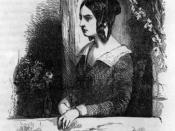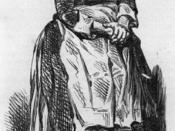The ending of the story is significantly different from both its beginning and development throughout out.
Its beginning is noticeably slow and carries a large part of it consisting of description and introduction to most of the characters, and Honore De Balzac forms a solid image of these characters in our minds and we then get a certain idea about them.
The beginning is a long introduction to the end of the story; it is slow, and monotonous, rarely displaying anything unexpected.
The ending however has is storing quite a few twists and turning points:Firstly we have to notice that there is a great increase of time and speed, as we can see that the events are passing rather fast and that there is definite progression and character development at the end.
We can notice that at the end, the writer takes all the liberties to giving it a clean and sharp finale.
The characters put to rest all conflict, personnel issues and all matters are settled.
As well as certain characters are killed off from the story, as result to the effect of passing time.
More themes appeared at the end, and we could see towards the ending we noticed a sort of explosion of feelings, emotions, events and personality changes.
A sudden burst of revelations that in which that snake finally reveals its fangs and will be the salvation of certain characters and the downfall of others.
We can start with the character alterations:Charles Grandet, the arrogant, spoiled cousin, who made a vow of eternal love to the naïve and loving Eugenie, who hastily accepted his romantic propositions at the time, and gave him gold to help him realize his dreams.
At first she is innocent and blind to her entourage, and the viciousness of the society.
But in contrast to the start I quote ÃÂShe is beautiful, but with the beauty now of a woman of nearly forty. Her face is pale, composed, and calm, her voice sweet but rather serious in tone, her manner unaffected. She has all the dignity that is acquired by suffering and the saintliness of a person who has kept her soul unspotted by contact with the worldÃÂ.
ÃÂHer tender heart, which always went out warmly to others, has been fated to find that others approach her only through motives of self-interest or calculation. The pale cold glitter of gold was destined to take the place of all warmth and color in her innocent and blameless life, and lead a woman who was all feeling to look on any show of affection with mistrust.ÃÂThis is what shows how she changed; this is now Eugenie, who has become her father, becomes a shrewd woman. ImpersonalAs for the matters of the heart, she writes to Charles a letter in which the content reveals to the reader that she now is a grown woman, who is not the gullible girl she used to be, as she severs any way of having Charles back into her life:ÃÂTo make your happiness more complete the only thing that I can offer you is your fatherÃÂs good name. Goodbye. You will always find a faithful friend in your cousin.ÃÂThis is a very dignified and very sincere ending, which divulges maturity.
The main character at the beginning was Felix Grandet, the richest man in Saumur, as the novel progressed the story starts circling around Eugenie as she got more involved with Charles, as she goes through the process of handing over her money to her cousin and quarreled with her father. But at the end she turns into her father, as we see that she becomes another version of him:A flush rose to EugenieÃÂs cheeks and she was silent; but then and thereshe made up her mind to turn an impenetrable face to the world, as her father had done.
Here she decides to trap her emotions, the same as her father used to do, clear evidence of character development.
Charles on the other hand, reveals to be quite the devious fellow, as he embarks on a voyage to the Indies in pursue of fortune and to pay all of his fatherÃÂs debts in order to clear his name.
This all seems at the beginning of the story as a worthy and honorable cause, as we progress and as the years go by, we learn that he was to be wed to the daughter of the Count DÃÂAubrion.
Charles turned into a money-obsessed maniac, who succumbs to the flaws of society and becomes himself a money-leeching character.
He disregards mademoiselle de AubrionÃÂs looks and hides his true intentions, he simply wishes to inherit her money and become Count of AubrionÃÂs.
And he reveals his true nature to Monsieur Des Grassins:ÃÂWithin the next few days, sir, I shall be the Comte DÃÂAubrion; so you will understand that the matter leaves me cold. Besides, you know better than I do that when a man has a hundred thousand francs a year his father has never been bankrupt.ÃÂHe is now a self-absorb man, who simply thinks for his own benefit in contrast to the start of the novel, he was less arrogant and full of himself, now he has become an unfeeling man, with ambition.
Changes happen to the main characters; however change can take form in more than one state. As we mentioned earlier that time passed quickly in a turn of a page.
With time, came death, which became an imposing theme in the story.
At the beginning the Grandet family has its health and fortune, until Charles who came into their lives, it is at that moment that their lives are changed, and towards the end, we can notice that the motherÃÂs health deteriorated quickly.
ÃÂMy mother is illÃÂ, she said, ÃÂLookÃÂ donÃÂt kill herÃÂGrandet was scared by the pallor of his wifeÃÂs usually dark, sallow face.
ÃÂHelp me to bed, Nanon,ÃÂshe said in a feeble voice.ÃÂ This is killing meÃÂ ÃÂAs you can see, Madame Grandet is too weak to walk, what differs from the start is that she is seen as a rather solid and elegant woman, and here, her strength is depletedÃÂ But psychologically, her personality does not change, her headstrong attitude remains with her throughout the story:ÃÂIf you do, I shall suffer less from the effect of the shock of your anger, and perhaps my life may be spared. My daughter, sir, I beg you to give me back my daughter!ÃÂÃÂHer death was worthy of her life. It was a death wholly Christian- is that not the same as saying it was sublime? Her virtues, her angelic presence, and her love for her daughter had never shone more brightly then they did in that October month in 1822 when she passed away. No complaint had ever passed her lips throughout her illness, and her spotless soul left earth for heaven with no regrets, except for her daughter, the sweet companion of her dreary life, for whom her dying eyes seemed to foresee untold ill-fortune. She trembled at the thought of leaving this ewe lamb, as innocent as she herself was, alone in a selfish world which sought to shear her fleece and take her treasureÃÂThis quote gives us a short but yet conclusive end to Madame GrandetÃÂs role in the story, and summarizes all her being.
Felix Grandet, father, has an attitude that is as stubborn as his wifeÃÂs.
His personality does not change from the start until the end, onto his deathbed and his last breathe, he is still the smart powerful tycoon he is.
ÃÂWatch over the gold!... Let me see some goldÃÂThis point out that he did not change throughout the story, his greed and lust for gold remains the same.
ÃÂThough GrandetÃÂs understanding was impaired, his greed for gold remained undiminished: it had become an instinct that survived the decline of his facultiesÃÂThis quote shows that he is still the same, but more compassionate towards his daughter as she is the only remaining person who cares for him and the only soul he can trust his fortune to.
ÃÂShe believed she had misjudged her old fatherÃÂs nature when she found herself that object of his most tender careÃÂThis shows how he has had a change of heart, and how at the end, he really is a caring father who wants only the best for his child. Unlike the beginning of the novel in which he is depicted as being a coldhearted man, uncaring and obsessed with his fortune.
ÃÂHis eyes, which for several hours had looked dull and lifeless, lit up at the sight of the crucifix, the candlesticks, and the silver holy-water vessel. He stared with concentration at the precious metal, and his wen twitched for the last timeÃÂÃÂTake good care of everything! You will have to give me an account of it all some dayÃÂThese two quotes affirm the statements above.
The ending is however satisfactory for those who have noticed how the writer intended for the plot to develop, as in the beginning he set the reader an image of the characters and throughout the story have a constant attitude which make them predictable, but the end is different, with the changes, those who were weak become strong, those who were strong become weak.
As we can see, all these changes from the start throughout the end, are the products of society, influencing the lives of people, the power of money and gold, and about how they can affect a person mind, heart and cloud his judgment, how the heart can mislead and confuse ones decisions.
All these things shown at the end of the story, where the writer expresses all of these themes to show how the characters resolve their conflicts with one another, with themselves, they put to rest any internal conflicts.
The speed increased as we neared towards the end of the story, so conclude to us, that only one person was left alive, the only person untainted by the lust for gold, or avarice is Eugenie Grandet.
Bibliography:-Honore De Balzac's Eugenie Grandet book-school notes




